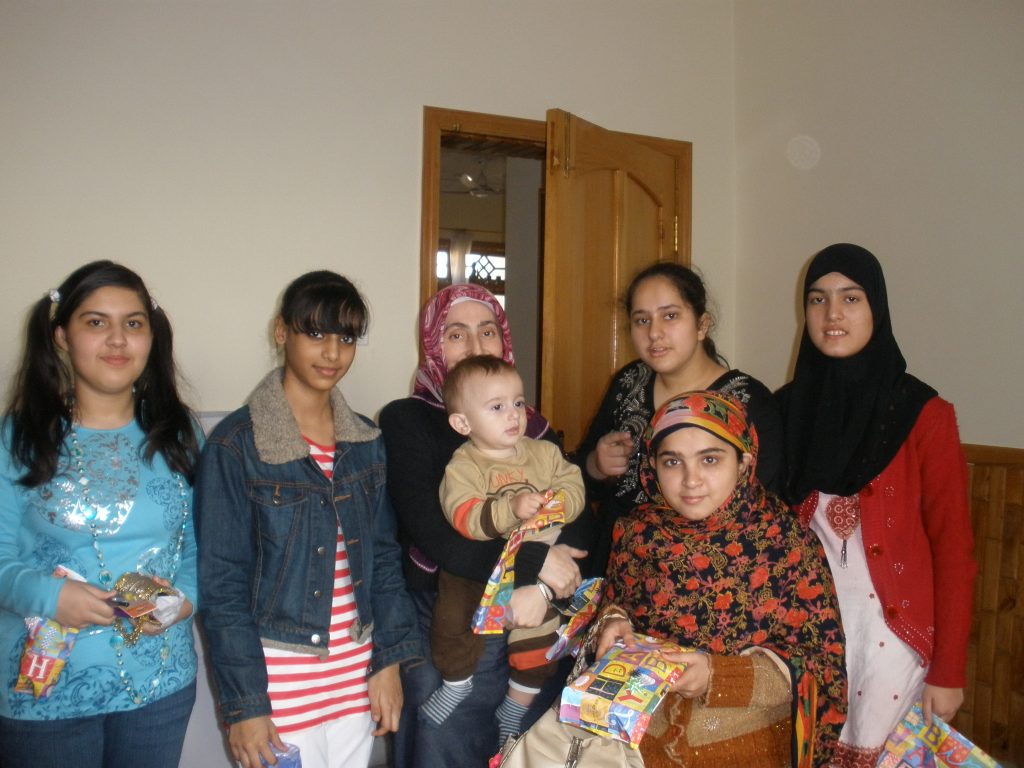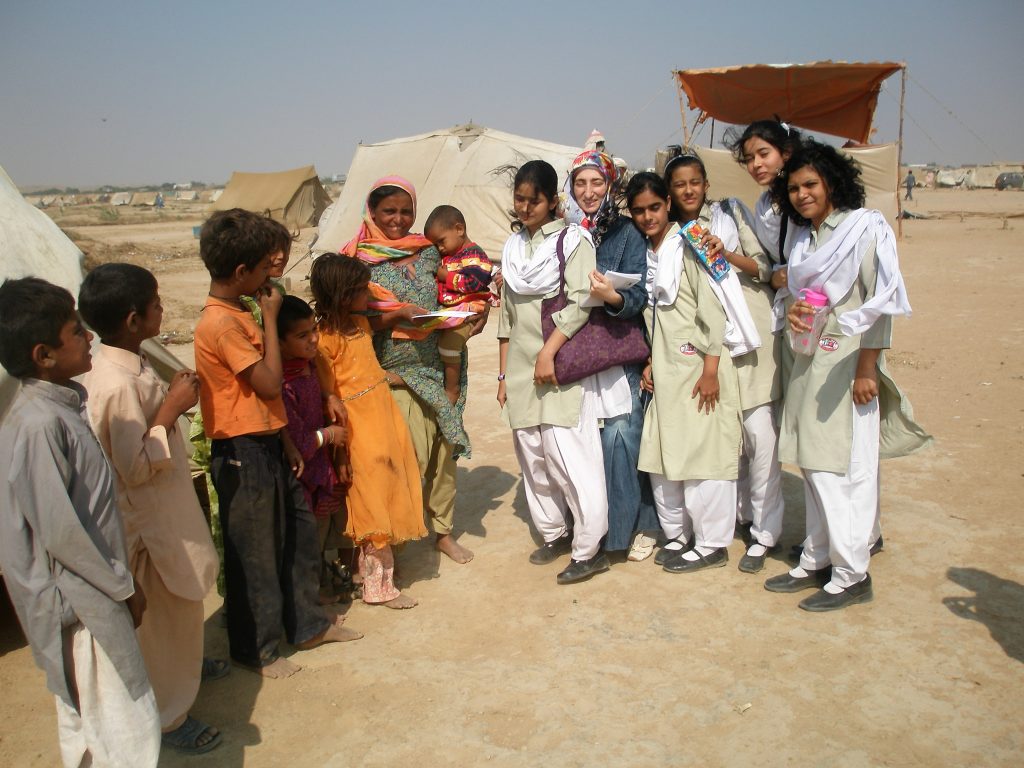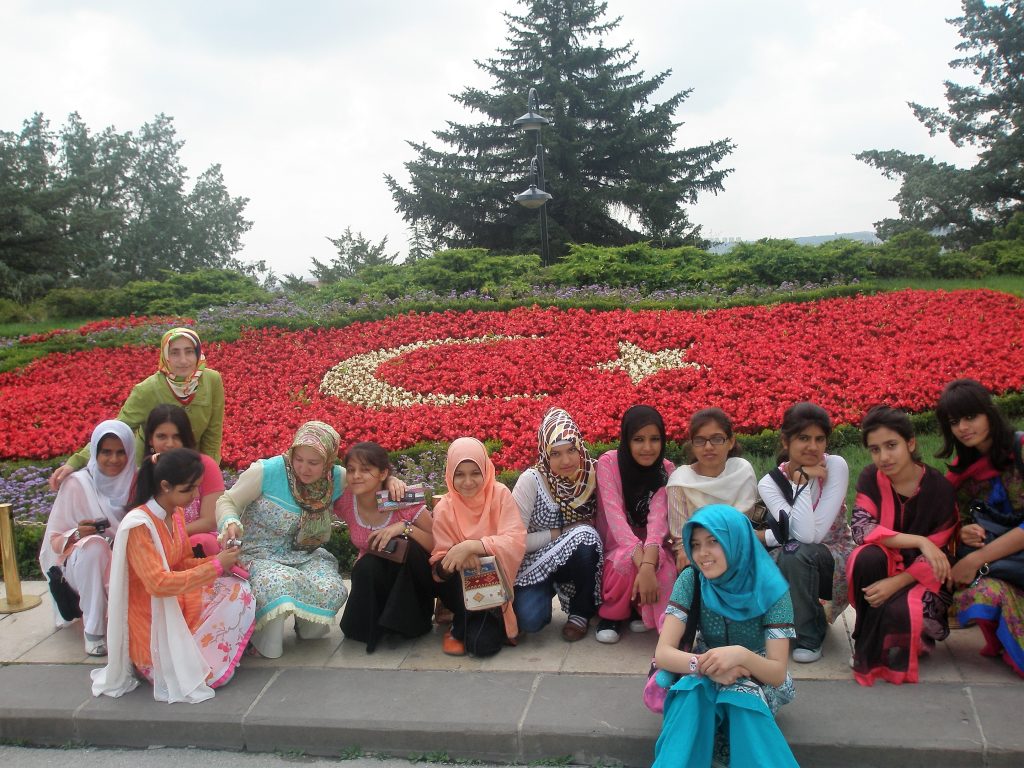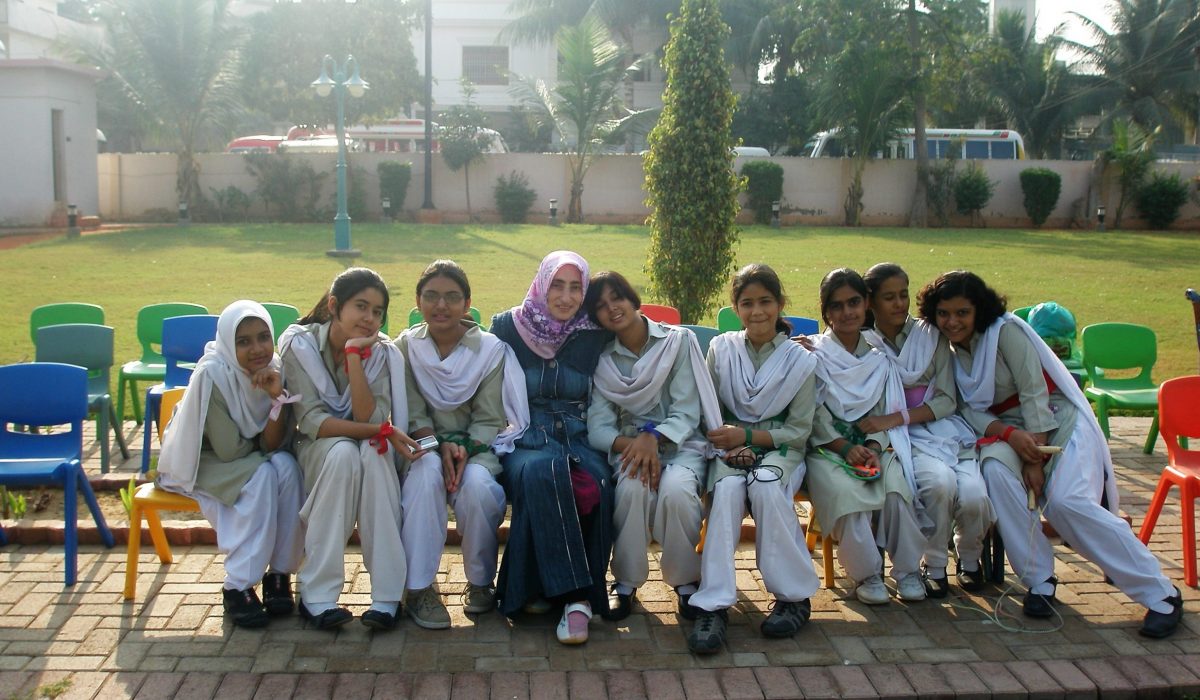Turkish Teacher Ayşegül Karahan (2): I wished my children to grow up in Pakistan

A Turkish school in the deserts of Balochistan and Pashtun students
June 12, 2021
Getting caught in the heat of Lahore while escaping the cold of Sivas!
June 15, 2021We publish the second part of our interview with Ayşegül Karahan, who started working at PakTurk School in Karachi after teaching Turkish in Peshawar for 3 years, and continue listening about her life in Pakistan and the phase of leaving there.
-Where did you go after Peshawar?
We moved to Karachi. Two completely different geographies with different languages, cultures and complexions. Peshawar is close to Afghanistan and Karachi is to India. I worked in Karachi for five years. On our first day in Karachi, they put a gun to my husband’s head on the street and robbed him of his wallet and other valuables. It was such a time. During my week in Karachi, I was afraid to leave the house.
-How was your relationship with students and their parents? What are your unforgettable memories with them?
I had a very nice guidance and counselling group among students in Karachi. I used to teach both the Turkish and the guidance classes. When I left Karachi, I learnt one of my students who used to participate in the programs regularly no longer attended. Her mother was also a teacher at our school, I called her and asked why her daughter stopped attending the counselling classes. The answer she gave was very meaningful for us to have an insight into the world of children. Our student told his mother, “A teacher comes and becomes like a mother to us; she becomes a part of us. We love her so much, but she leaves us after 2-3 years. Then another comes and we go through the same things. Just as a child gets sad when she is separated from his mother, I experience the same sadness every time. I don’t want to get used to the new teacher so as not to be upset after that. My heart is too small, I can’t stand it” and so explained the reason for not attending to the sessions. Those words hit me hard. Sometimes we do not realize what affects children this much.
I generally hosted my students at my home during those sessions. We had a glass coffee table in the middle of the sitting room. While playing there, the students hit it and split it in half. Those were high school kids. At first, they were nervous. I consoled them by saying, “It’s okay, fortunately, nothing happened to you,” and placed the broken table behind a sofa. I did not throw it right away in case it could be fixed. It stayed there for a long time. The students saw the table a couple of times more whenever they visited my house. Sometime later, those students were at my house again with the new students in the class. The new students were obviously wondering, “What are we going to do at the teacher’s house, will it be boring?” Veteran students explained the nature of our programs and introduced me to the newcomers. They were speaking Urdu among themselves. They got up for a moment and looked behind the sofa. They wanted to show the broken glass table to the newcomers. Summer passed and we removed the table from there. It was very important to the students; they wanted to say “even though we broke the table, she didn’t say any words of hurt to us and she didn’t even grimace. Look, that glass table is here.” That was very important in the realms of those students.
AN INTERESTING PARENT STORY… HOW DID IT BEGIN AND END?
One of the parents was very interesting. Her daughter had just been enrolled in the school. I went to visit her with a friend because my English needed improvement. Our student opened the door and her mother greeted us while lying on her bed. I felt so weird. We were two teachers sitting on the chair and she was there in front of us. Our student came up and asked, “Would you like to drink fruit juice?” His mother didn’t even get up while we were leaving. I was shocked of course. I had never seen anything like that in Peshawar. She was a very smart girl. She was enrolled in Grade 9 and, even though she had not been to any language prep class, she started to speak Turkish with her classmates in a short time. Her mother was a school principal in a district of Karachi, I learned later. I organized a one-week boarding program for students at my house during the semester break. I included that student too. The mother, who had never sent her daughter to overnight stay anywhere before, visited us every day with an excuse. One day she brought some cake and the next day something else. She came, looked around, talked to the children and left.

After a week’s program, the students returned to their homes and that parent sent me a short message. “You gave a very beautiful and important training; it was marvellous. This is something that should be in the newspapers. You are making great sacrifices by preparing such comprehensive programs. I have been a teacher for 30 years, and I have never seen such a sacrifice” and also added exaggerated statements like “Everyone should know this…” Later, she invited us to her house. This time she greeted us at the door and offered us very delicious treats. The next year, she invited us to the school where she was the principal. She asked us to conduct a scholarship exam for the students of her school. She hosted us there all day long. As a result of the exam, we enrolled some students from her school into PakTurk on scholarship. She went and convinced their families herself. She conducted the interviews. She also sent her daughter on a trip to Turkey with me. How we had started, how it ended… 😊
-You said you stayed in Karachi for 5 years. What was your next address?
After Karachi, we moved to Islamabad, the capital of Pakistan. It was a very different geography as well. It was nicer and more comfortable than other cities. We had a very nice group of friends with local teachers. We were like sisters with the principal of the school, Maryam. She had given me a handmade shawl as a gift when I was leaving. She had said, “This is a gift to a sister only when she gets married and leaves home.” It was very special for me.
We had organized a trip to Karachi with four teachers. One of the friends was generally cold and distant to us. We sat next to each other on the plane on our way back. I asked her how the trip went. She told me: “I worked at another school before. I wanted to change my school. I recited kalima-e-tawhid a million times for Allah to bestow me with a good school as the workplace and to give me an auspicious opening. I later came to PakTurk. My only reason to choose was that it was a girls’ school. I have been hearing the word ‘PakTurk family’ from everyone since I came here. It seemed so stupid and ridiculous at first. How can an institution, a school be a family? But now, at PakTurk, I feel that I am a part of the family with you, that I am a part of the whole, that I am worried about the problems of this place. I never thought this could happen. But I feel it in my heart right now.”
I CAN SAY PAKISTAN CHANGED MY OUTLOOK TOWARDS RELIGION
Every morning, we held a discussion-based reading circle that lasted for a lesson’s duration with fellow teachers. A Pakistani friend who knew Turkish very well was reading the book and translating it into English. We finished 4-5 books from the Risale-e-Nur Collection that way. The mother of one of those friends came to visit us when we were leaving the country. She brought my daughter gold earrings as a gift. “Please keep these as gifts, you can put them on your daughter at the time of her marriage” she said. That aunt cried more than myself that day. “How could they do this to you? I apologize on behalf of the people of Pakistan,” she said. My friend’s father would also go for the Umrah that year. “Indeed, testing things happen to those who endeavour on the path of Allah. That’s why it has happened to you. I will pray for you in front of the Kaaba”, he said.
-What were the effects of Pakistan on your personal world? Are there things you miss?
Our two children were born while we were there. My son was born in 2008 and my daughter was born in 2013. I delivered my children in Turkey because they coincided with the summer vacation, but we returned to Pakistan when they were only 1 week old. I started classes at the school when my baby was only 25 days old. In my opinion, Pakistan was not a place where people who did not have a serious reason or ideal would want to come from abroad and live. There were embassy personnel, some exchange military personnel and us from Turkey in Pakistan.
As a person who grew up in the Black Sea highlands in Turkey, I really had a hard time in Pakistan. I was not used to the spicy food, but my older son often asks for biryani from me. During our last year in Pakistan, I and my students used to go and eat golgappa, I miss that experience. Unfortunately, I managed to learn a little Urdu. I attended to an English language school for 3 months and I could not continue further. Over the years, I’ve learned enough to get along on a plain conversation level.
I can say that my outlook towards religion changed in Pakistan. In Turkey, religious practice is a little more regulated. In Pakistan, for example, the adhan may be recited 50 times a day, not just five times a day. In all mosques, the adhan is not recited at the same time and prayers are not performed when it is the time. Each mosque determines its own prayer time and the adhan is called at that time. It is not possible to miss the congregational prayer. If it’s over in one mosque, you can always rush to another to make it on time. So are the Friday prayers. This opened my horizons even more. I could see it was possible to practice more flexibly.

I have never felt the sunnah of i’tikaf in Ramadan so intensely in my life. Even the students would remain in i’tikaf. My perception and outlook towards some practices of the Holy Prophet (PBUH) became keener.
I still have a hard time talking about Pakistan. If my students send me messages, I only reply to them. Other than that, I do not follow the news and other details. After coming here, I tried very hard to treat myself. The things I experienced there were so hard, but leaving there was harder. I honestly don’t want to remember it again ☹ (tears…)
TWO FAMILIES SHARED THE HOME APPLIANCES
-What did you experience during the leaving process? How was the support of the people of Pakistan for you?
Unfortunately, the effects of the events in Turkey in July 2016 also impacted us. We didn’t know where to go or what to do when everyone at the PakTurk Schools were ordered to leave the country within 3 days. A local friend of mine said to me, “Don’t touch anything, I’ll sell all your stuff and give you the money.” It really helped. She even chided me in a friendly way, “You put low prices!” and negotiated with the buyers herself. Yet, after those three days, a situation ensued when we could stay a little longer. First, it was said, “The court extended the date of departure for 10 more days”. Later, with the UNHCR’s protection decision, we stayed in Pakistan for one more year. We had sold everything. This time, the same friend brought the items she bought herself and gave them to us without taking money. I used them for one more year. We moved to a smaller house. We lived in a 2-storey house with a friend and her family in another portion. We purchased the washing machine, oven and some other home appliances and items from the second-hand market and jointly used them, because what we would become was still uncertain.
-Some families had left earlier, why did you stay until the end of that one year?
My heart bond with the country was still intact. I thought there was more I could do. I didn’t want to leave it halfway. We loved Pakistan. I wanted our children to grow up there. We had students and parents who wanted us there. Protests took place for days. It didn’t feel right to leave immediately while they were doing all those things in support for us. That’s why we chose to stay there a bit longer. At the end of that one year, we decided to leave especially when a Turkish educationist family was abducted from Pakistan.
In that last year, a friend came one night and said to us in a hurry, “You’re coming with me right now, we have to get out of here!” We immediately wake the children up, took our passports, packed extra clothes for the children and left our residence. We went to a parent’s house. Other friends came to the same place. We didn’t sleep all night. Towards the morning prayer, we called one of our students and just said to her, “We are coming to you”. Her house was 20 minutes away. When we got there, she was waiting with the garage door open. In the meantime, she prepared the house for us, emptied her room, prepared the beds. Only her mother knew about our coming. Her father had not been informed yet. It was one of the unforgettable moments for me. We came there not knowing how long we would stay and we ended up staying there for a week. As two families we spent time together and cooked in the same kitchen. I cooked Turkish dishes for them and they cooked us dishes from the local Pakistani cuisine. We had very good friendships. We still keep in touch with that family. That was how they took care of us. Pakistan is a really precious place for me thanks to her people. Two weeks after that sudden house-leaving incident, we left Pakistan for good in November 2017.
-Where did you go after Pakistan?
First, we went to Kosovo via Serbia. We had some trouble at the airport. We stayed in Kosovo for 6 months. My daughter’s passport would soon expire. We wanted to solve the passport problem and go to another country to continue teaching there. Since the Turkish consulates did not process our passport applications, we had to travel to Germany and seek asylum. Even while we were dealing with these problems at that time, 6 teachers from the Turkish schools in Kosovo were abducted and taken to Turkey. My husband was in Kosovo with my son and I stayed with my daughter at a sister’s house in Germany for about 2 months. May Allah bless her and her family. After that, we took refuge here in Germany. My youngest son was also born here. He grew up in the refugee camp.
YOU NEED TO TALK ENGLISH AT THE CINEMA!
-Can you tell us about the reflections and effects of the social, cultural and moral activities you did with the students?
Children with different religious traditions and denominations were together under the roof of our schools. That meant a lot for me. Buddhist, Hindu, Sunni, Shiite students were together and there was no problem. For example, there were autonomous regions near Peshawar where the provincial government did not interfere in the administration. The students who came to our schools from those regions gradually moved away from radical religious mindset and adopted a more tolerant and moderate outlook towards others. More moderate, open-minded, non-radicalized students were coming forth in PakTurk Schools. Therefore, the administrators of that autonomous region had built a large dormitory in Peshawar on the condition that more students be admitted in the PakTurk Schools.

“I learned from my Turkish teachers that the headscarf was an obligatory part of Islam,” one of our female students wrote in a message. His mother was an Arabic teacher. “The hijab was a traditional thing for me. Normally I would cover my head but open it on weddings and other functions. In fact, I learned from my Turkish teachers that this was a requirement for veiling” she was saying.
When I went to the movies for the first time with my students, I saw that they all started speaking English there. When I asked them why, one of them said, “It’s a shame, ma’am, is Urdu ever spoken in the cinema? You need to speak English. If you speak Urdu, you will appear as a peasant!” Children were unconsciously ashamed of the way they were. Another student of mine said: “I was embarrassed because my mother did not speak English. I made do with that misconception after getting to know you people. I learned from you that not knowing English is nothing to be ashamed of.” I was not bothered at all as I did not speak English. Children must have observed that ease. Both they and I had our perspectives and horizons expanded.
Students or teachers always sat cross-legged when sitting across from each other. I said that was considered inappropriate in our culture as it was perceived as disrespectful to the other party. One of my students said, “Actually, this is a very inappropriate thing in our old culture as well.” That was an attitude that had settled under the influence of the Western culture. My students would not do that. “You will be happy and successful if you are yourself,” I used to tell them.
THEY ENTRUSTED THEIR DAUGHTERS TO ME
The people of Pakistan were and are truly self-sacrificing people. I do not know whether I made a sacrifice by going there, or if they made a sacrifice by accepting me as I was. I did not dress like them, I could not speak their language, I could not eat many of their dishes, so I was different. Yet, they entrusted their precious children to me. They entrusted their daughters to me. I took those children to Turkey and chaperoned them on tours, one city after another. We were invited to the wedding reception of the security guard of our school. When we reached there, the atmosphere of the wedding changed. Normally, no one – except her mother or siblings – would see the bride before she got ready. There they took me only into the preparation room of the bride. I was both touched and surprised. Nobody knew me, so it was not a value given to me personally. It was an expression of the value given to all of my teacher friends.
When there was a flood disaster, I went to the region with my students and distributed relief materials. They had also conveyed their condolences to us at the time of an earthquake in Turkey. It was based on mutual friendship. In one of our visits, we met a lady whose grandfather had participated in the Battle of Gallipoli and kept diaries. She took out a photo album and narrated lots of memories… She told so much about the Battle of Gallipoli that maybe I did not have that much detailed information myself. We had heard about Allama Dr. Muhammad Iqbal’s address in a Lahore square to support the Ottoman during the Battle of Gallipoli and the generous donations made by the Muslims of the Subcontinent, but I had not heard about the fact that there had many people from the Subcontinent who had stayed in Ottoman Turkey in those years.
The End
***
Part One: Turkish Teacher Ayşegül Karahan: Pakistan was tough but beautiful





No Comment.